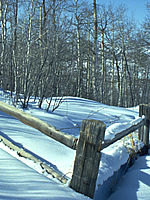
Provence, BillyAboutSession One: Blacksmithing: Billy began at an early age in his grandfather's blacksmith shop. This session covers his blacksmith career to date, including the years he has worked as the blacksmith for the Museum. Session Two:Cowboy Years: Billy has worked as a cowboy on various ranches in New Mexico. This session outlines his daily activities, working conditions and other cowboys he has met over the years.
GalleryGalleryBlacksmith
Billy Provence working in the blacksmith shop at the New Mexico Farm and Ranch Museum Abstract
Tape 1, Side A
Brief history of the blacksmith trade. Billy was raised by his grandparents. His granddad was a blacksmith who owned a shop in Sudan, Texas. Billy was allowed to start hammering hot metal when he was eight years old and says that while he was not making anything he was learning the temperature of the metal by its color. He made his first knife when he was ten. There have been blacksmiths in the Provence family since the 1800s. The blacksmith shop essential equipment and the individual parts of the forge are discusses. When asked why a blacksmith shop is always dark, Billy explains that it is so that the blacksmith can see the true color of the metal when it is hot so that the correct temperature can be reached and maintained. Billy discusses the items that he makes and the items he sells in the shop at the Museum. These include cooking utensils, crosses made from pony shoes, letter openers, tripods, spit sets, portable grills, sporks, dinner bells, business card holders, fireplace tools, key chain holders and a variety of hooks. In addition to these items Billy also makes a variety of knives such as a Bowie knife, kitchen knives, utility knives, skinning knives, and a knife with a long narrow blade known as the Arkansas Toothpick. Many people confuse a blacksmith with a farrier. Billy blames the confusion on Hollywood western movies which always show a blacksmith making a horseshoe. Farriers broke off from the blacksmith sometime in the 1600s. Billy uses good high carbon steel for his knives, although metal farm equipment such as plow points, sweeps and shears can also be used to make a knife. He uses an old farm disk to make an Inuit and Aleut curved blade knife known as an ulu. The joys and challenges of doing demonstrations for tours of different ages, and the clothing Billy wears for blacksmithing are briefly discusses. The interviews he has done for class projects, for magazine and newspaper articles, and the video that was shot are discussed. While his hope is that blacksmithing will continue, he states that he just does not know what the future holds for the blacksmith trade.
Tape 2, Side A
This session opens with a discussion about his childhood and home life. Chores, holidays, school and town life are discussed. Billy rode bare-back broncs and bulls in junior rodeos for several years. He recalls that his first job was working for a salary of $350 a month plus housing and utilities. He describes the work he was expected to do at different times of the year. Other ranches he worked at before he served in the Army and after he returned are discussed. His knowledge of balcksmithing was also put to use on some of the ranches he worked on. Feeding, roundup, branding, and specific camps are discussed. As his children got older they would also help with mending fence, repairing water lines, and other chores. While most of his children have a basic knowledge of cowboy work, Billy is thankful that none of them are cowboys today with the exception of his oldest son, Jeff, who works for a feedlot in Texas. There is a brief discussion of the working relationship between ranch owners, ranch managers, and the cowboys. Most cowboys carried certain necessities such as fencing pliers, cigarettes, and toilet paper in saddle bags. The differences in the cowboy's choice of lasso, and basic cowboy responsibilities are also discussed. When asked if he would choose to be a cowboy if he had the opportunity for a "do over" Billy responds that he would not choose to be a cowboy because being on horseback tells on your joints. As a young person you don't think about being bucked off a horse or banging up a knee or a shoulder. Billy was asked what he would say if one of his grandchildren came to him and said that they wanted to be a cowboy and work on a ranch. He states that he would encourage them to do something else. In fact, he says that his son, Jeff, has told him that he doubted Billy could even work on a ranch or in a feedlot today. Still, Billy feels that being a cowboy was a good life because the family was close and you were away from all the distractions of town life. |
